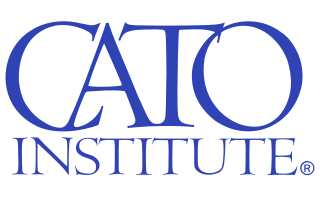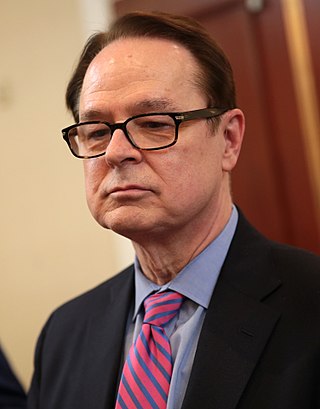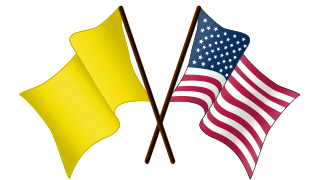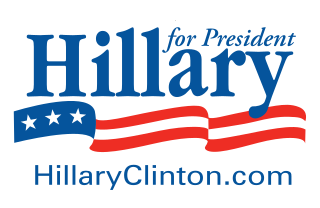
The Cato Institute is an American libertarian think tank headquartered in Washington, D.C. It was founded in 1977 by Ed Crane, Murray Rothbard, and Charles Koch, chairman of the board and chief executive officer of Koch Industries. Cato was established to focus on public advocacy, media exposure, and societal influence.
Imperial presidency is a term applied to the modern presidency of the United States. It became popular in the 1960s and served as the title of a 1973 book by historian Arthur M. Schlesinger, Jr., who wrote The Imperial Presidency to address two concerns: that the presidency was uncontrollable and that it had exceeded its constitutional limits. According to professor of political science Thomas E. Cronin, author of The State of the Presidency, "imperial presidency" is a term used to define a danger to the American constitutional system by allowing presidents to create and abuse presidential prerogatives during national emergencies. This was based on: (1) presidential war powers vaguely defined in the Constitution, and (2) secrecy – a system used that shielded the Presidency from the usual checks and balances afforded by the legislative and judicial branches.

William Floyd Weld is an American attorney, businessman, author, and politician who served as the 68th Governor of Massachusetts from 1991 to 1997. A Harvard graduate, Weld began his career as legal counsel to the United States House Committee on the Judiciary before becoming the United States Attorney for the District of Massachusetts and later, the United States Assistant Attorney General for the Criminal Division. He worked on a series of high-profile public corruption cases and later resigned in protest of an ethics scandal and associated investigations into Attorney General Edwin Meese.
Gil Troy is an American presidential historian and a popular commentator on politics and other issues. He is a professor of history at McGill University. Troy is the author of twelve books, and the editor of two. He writes a column for The Daily Beast on forgotten history, putting current events in historical perspective and is a columnist for The Jerusalem Post.

David Douglas Boaz was a libertarian author, philosopher and editor. He was a distinguished senior fellow and the executive vice president of the Cato Institute, an American libertarian think tank. Boaz was a prominent advocate for individual liberty, limited government, free markets, and non-interventionist foreign policy.

Ayn Rand's philosophy of Objectivism has been, and continues to be, a major influence on the right-libertarian movement, particularly libertarianism in the United States. Many right-libertarians justify their political views using aspects of Objectivism.

Sidney Stone Blumenthal is an American journalist, political operative, and Lincoln scholar. A former aide to President Bill Clinton, he is a long-time confidant of Hillary Clinton and was formerly employed by the Clinton Foundation. As a journalist, Blumenthal wrote about American politics and foreign policy. He is also the author of a multivolume biography of Abraham Lincoln, The Political Life of Abraham Lincoln. Three books of the planned five-volume series have already been published: A Self-Made Man, Wrestling With His Angel, and All the Powers of Earth. Subsequent volumes were planned for later.

In political studies, surveys have been conducted in order to construct historical rankings of the success of the presidents of the United States. Ranking systems are usually based on surveys of academic historians and political scientists or popular opinion. The scholarly rankings focus on presidential achievements, leadership qualities, failures, and faults. Popular-opinion polls typically focus on recent or well-known presidents.
This is a list of books and scholarly articles by and about Hillary Clinton, as well as columns by her.

William Arthur Niskanen was an American economist. He was one of the architects of President Ronald Reagan's economic program and contributed to public choice theory. He was also a long-time chairman of the Cato Institute, a libertarian think-tank.

Hillary Diane Rodham Clinton is an American politician and diplomat. She was the 67th United States secretary of state in the administration of Barack Obama from 2009 to 2013, a U.S. senator representing New York from 2001 to 2009, and the first lady of the United States as the wife of Bill Clinton from 1993 to 2001. A member of the Democratic Party, she was the party's nominee in the 2016 presidential election, becoming the first woman to win a presidential nomination by a major U.S. political party and the only woman to win the popular vote for U.S. president. She is the only first lady of the United States to have run for elected office.

Paul G. Kengor is an author and professor of political science at Grove City College and the senior director of the Institute for Faith and Freedom, a Grove City College think tank. He is a visiting fellow at Stanford University's Hoover Institution on War, Revolution, and Peace. Kengor has focused much of his work on Ronald Reagan, faith and the presidency, conservative politics, the Cold War, Communism, and Catholicism.

Hillary Rodham Clinton, then junior United States senator from New York, announced her campaign for the 2008 Democratic Party presidential primaries on her website on January 20, 2007. Clinton was previously the first lady of the United States and first lady of Arkansas prior to her election as U.S. Senator from New York. She is also the wife of former President Bill Clinton. Clinton was the source of much media speculation since having expressed interest in being a candidate in the 2008 presidential election since at least October 2002.
The following is a timeline of major events leading up to and immediately following the United States presidential election of 2008. The election was the 56th quadrennial United States presidential election. It was held on November 4, 2008, but its significant events and background date back to about 2002. The Democratic Party nominee, Senator Barack Obama of Illinois, defeated the Republican Party's nominee, Senator John McCain of Arizona.

Barack Obama's tenure as the 44th president of the United States began with his first inauguration on January 20, 2009, and ended on January 20, 2017. Obama, a Democrat from Illinois, took office following his victory over Republican nominee John McCain in the 2008 presidential election. Four years later, in the 2012 presidential election, he defeated Republican nominee Mitt Romney, to win re-election. Obama is the first African American president, the first multiracial president, the first non-white president, and the first president born in Hawaii. Obama was succeeded by Republican Donald Trump, who won the 2016 presidential election. Historians and political scientists rank him among the upper tier in historical rankings of American presidents.
U.S. President Barack Obama's East Asia Strategy (2009–2017), also known as the Pivot to Asia, represented a significant shift in the foreign policy of the United States since the 2010s. It shifted the country's focus away from the Middle Eastern and European sphere and allowed it to invest heavily and build relationships in East Asian and Southeast Asian countries, especially countries which are in close proximity to the People's Republic of China (PRC) either economically, geographically or politically to counter its rise as a rival potential superpower.
This bibliography of Barack Obama is a list of written and published works, both books and films, about Barack Obama, the 44th president of the United States.

The Reagan era or the Age of Reagan is a periodization of recent American history used by historians and political observers to emphasize that the conservative "Reagan Revolution" led by President Ronald Reagan in domestic and foreign policy had a lasting impact. It overlaps with what political scientists call the Sixth Party System. Definitions of the Reagan era universally include the 1980s and the early 1990s, while more extensive definitions may also include the late 1970s, all of the 1990s, and even the 2000s. In his 2008 book, The Age of Reagan: A History, 1974–2008, historian and journalist Sean Wilentz argues that Reagan dominated this stretch of American history in the same way that Franklin D. Roosevelt and his New Deal legacy dominated the four preceding decades.

This timeline of modern American conservatism lists important events, developments and occurrences that have affected conservatism in the United States. With the decline of the conservative wing of the Democratic Party after 1960, the movement is most closely associated with the Republican Party (GOP). Economic conservatives favor less government regulation, lower taxes and weaker labor unions while social conservatives focus on moral issues and neoconservatives focus on democracy worldwide. Conservatives generally distrust the United Nations and Europe and apart from the libertarian wing favor a strong military and give enthusiastic support to Israel.

In 2016, Hillary Clinton ran unsuccessfully for president of the United States. Clinton ran as the Democratic Party's candidate for president, in which she became the first woman to win a presidential nomination by a major U.S. political party. Prior to running, Clinton served as the United States secretary of state in the administration of Barack Obama from 2009 to 2013, a U.S. senator representing New York from 2001 to 2009, and the first lady of the United States as the wife of Bill Clinton from 1993 to 2001. She was defeated in the general election by the Republican candidate, businessman Donald Trump.














